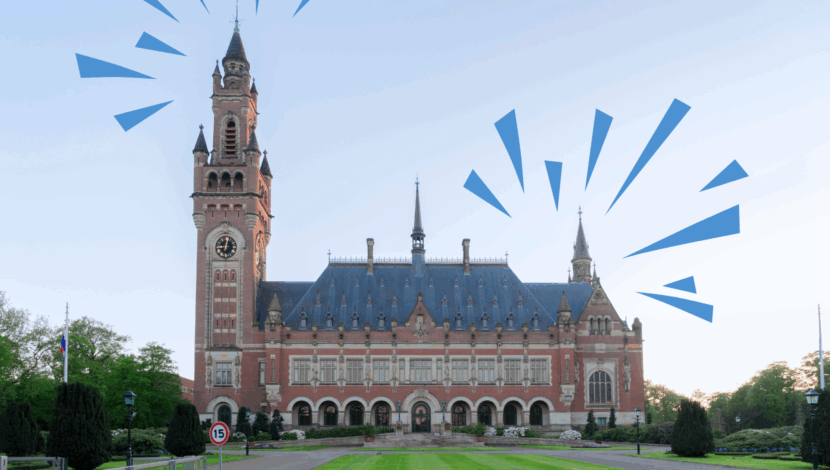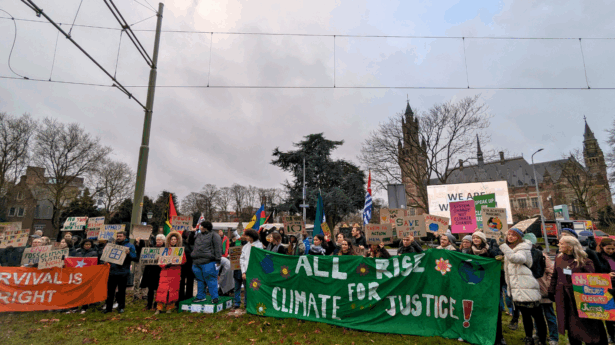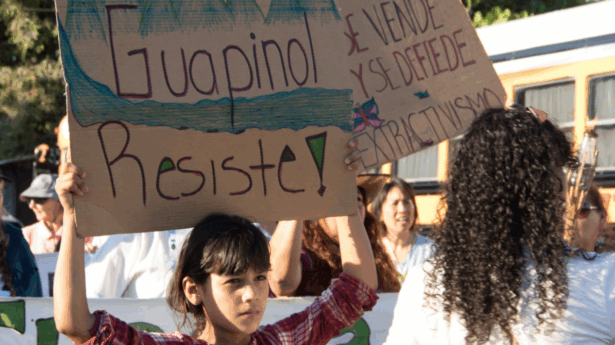The Unitarian Universalist Service Committee advances human rights through grassroots collaborations.
Celebrating the wins: The ICJ Advisory Opinion on Climate and the global movement for climate justice

August 14, 2025
On July 23, after a relentless six-year campaign led by Pacific Island youth, the International Court of Justice issued its advisory opinion on states’ climate obligations. Speaking to a packed courtroom and thousands watching around the world, the ICJ blew past expectations and issued a powerful, unanimous opinion. The court ruled that states are legally obligated to protect the climate, and failure to do so is an internationally wrongful act that can result in reparation requirements.
“Today the world’s smallest countries have made history,” said Vishal Prasad, Director, Pacific Islands Students Fighting Climate Change. “The ICJ’s decision brings us closer to a world where governments can no longer turn a blind eye to their legal responsibilities. It affirms a simple truth of climate justice: those who did the least to fuel this crisis deserve protection, reparations, and a future. This ruling is a lifeline for Pacific communities on the frontline.”
What did the court say?
The court acknowledged the urgency and scale of the issue, stating that the climate crisis was an “existential threat of planetary proportions.” The court held that climate change treaties outline binding obligations for countries to protect the climate system, including to:
- adopt measures to reduce emissions and adapt to climate change,
- limit emissions and enhance greenhouse gas sinks and reservoirs,
- cooperate with one another to protect the climate,
- diligently contribute to the goal of limiting post-industrial global warming to 1.5 degrees Fahrenheit. States must prepare progressive “Nationally Determined Contributions” that are capable of meeting this goal.
The court further held that even outside of climate change treaties, countries have a duty under customary international law to protect the climate by acting with due diligence and using “all means at their disposal” to prevent climate harm. This means that countries such as the US cannot evade their climate obligations by withdrawing from the Paris Agreement.
The court also recognized the critical and obvious intersection of climate justice and human rights. A healthy climate is essential to the right to life, the right to health, and the right to an adequate standard of living. The ICJ found that the right to a clean, healthy, and safe environment was a precondition to these rights, and therefore, countries also had an obligation to protect the climate under human rights law. They briefly addressed the issue of climate-forced displacement, stating that countries must not return a person to their country of origin “where there are substantial grounds for believing that there is a real risk of irreparable harm to the right to life”.
Finally, they held that the breach of these obligations by any country could be an internationally wrongful act which might entail obligations to cease the wrongful actions, provide guarantees of non-repetition, and, critically, pay full reparation to injured countries in the form of restitution, compensation, and public accountability. In this regard, they specifically called out fossil fuel production, consumption, subsidies, and exploration licenses as a “failure…to take appropriate action to protect the climate system from GHG emissions.”
What next?
The ICJ Advisory opinion joins two other decisions by international tribunals on state climate obligations – the International Tribunal on the Law of the Sea and the Inter-American Court of Human Rights (IACHR). The IACHR opinion was developed after significant consultations with affected communities and, unsurprisingly, was bolder than the ICJ’s. It went further on the issues of states’ human rights obligations, the rights of nature, and the issue of climate-forced displacement.
These advisory opinions form part of a constellation of international strategic litigation on climate. Litigants across the world will draw upon these opinions to push their countries to take action and provide reparations for the homes and lives already lost to climate change. The opinions also change the playing field of upcoming climate negotiations. Many of the arguments big polluting nations presented before the ICJ mirror those they use in international climate negotiations to deny funding for loss and damage or present grossly inadequate emissions reduction targets. These nations have been dealt a blow by the world’s highest court.
As a next step, the UN General Assembly will be introducing a resolution acknowledging the findings of the ICJ. Advocates and diplomats are working to ensure it fairly represents the findings of the judgment. Advocates are already arming themselves with the ICJ’s findings on the right to a clean, healthy, and safe environment at the ongoing negotiations of the plastics treaty. The 2025 United Nations Climate Change Conference (COP30) will be another battleground. Activists’ focus on strategic litigation had been partly inspired by a desire to break through low ambition and deadlock at climate negotiations. Advocates around the world are working to ensure that the ICJ’s findings inspire higher ambition at COP30 and tangible results for affected communities, including greater contributions to the Loss and Damage Fund.
Celebrating the wins
In challenging times, it’s crucial that we celebrate our wins. We give huge thanks to our partners PISFCC, the global youth movement, Vanuatu, and the alliance. We’re so grateful to all the witnesses who testified at the People’s Assembly and to our members who supported this campaign by sending messages to the Witness Stand, donating, or continuing to fight for climate justice in their own communities. We celebrate while preparing for the next fight, together.

